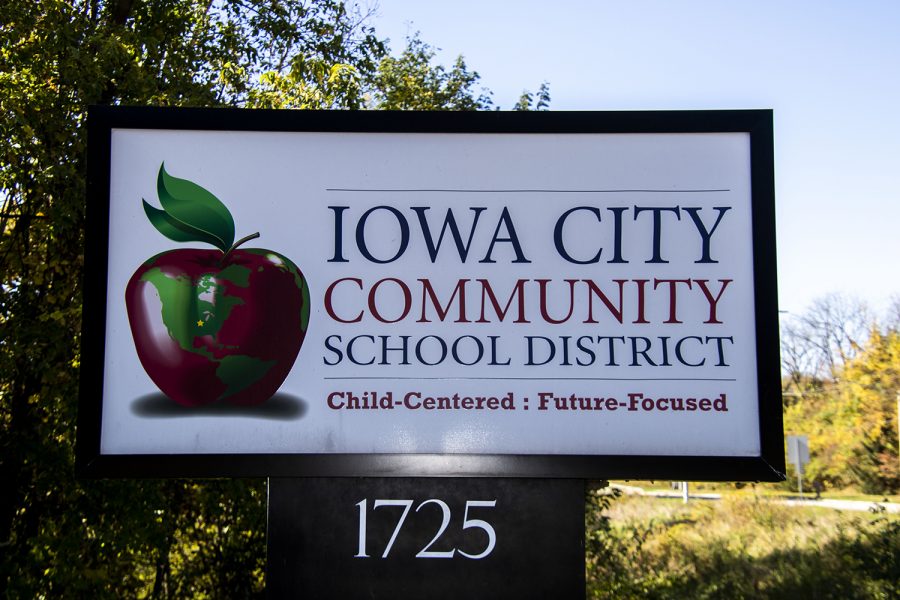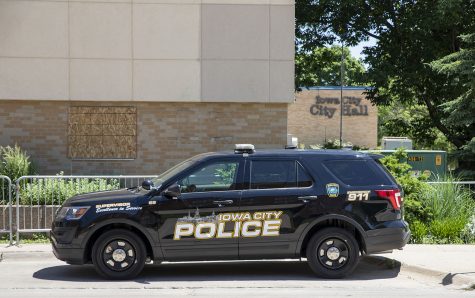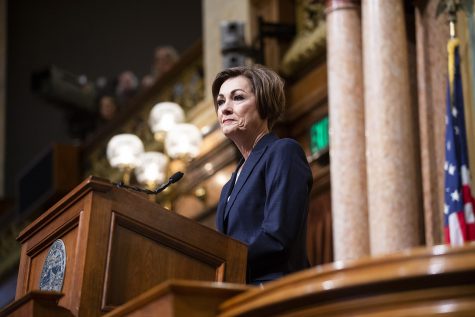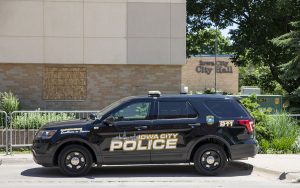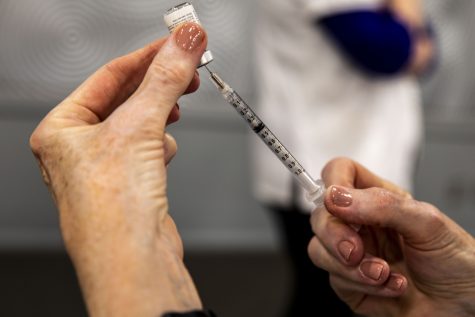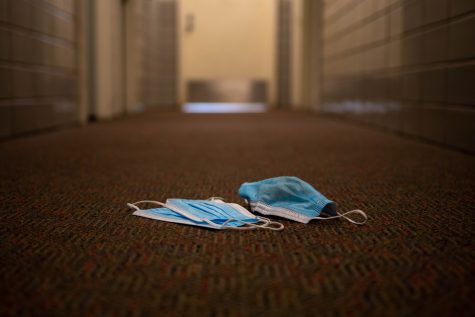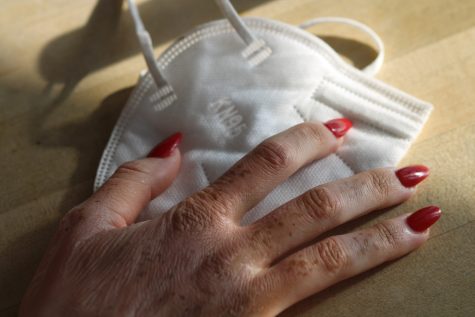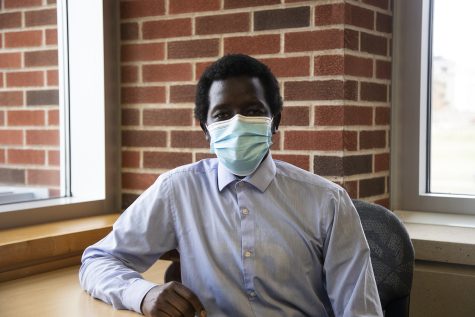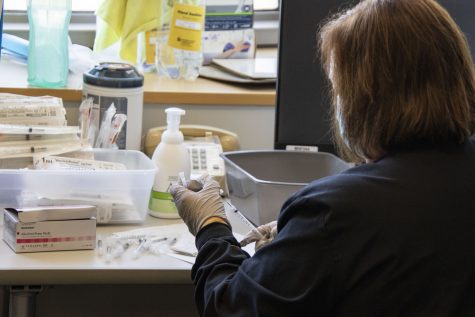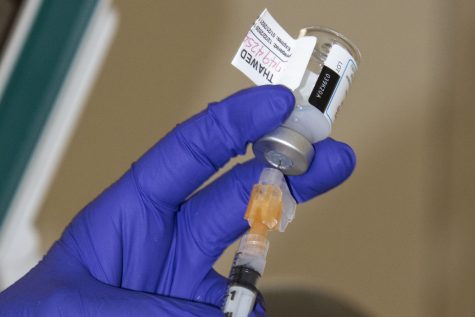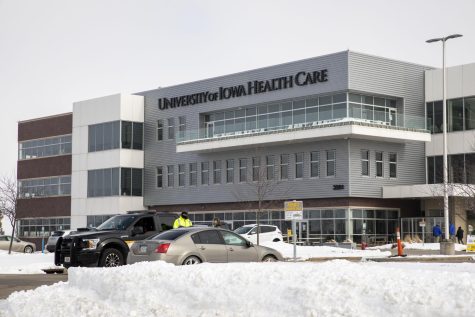Iowa City schools look to provide mental health resources while protecting physical health
Beginning Monday, the Iowa City Community School District is holding classes 100 percent online for at least two weeks. While protecting physical health, the district has also had to consider the mental health impact online school is having on students and faculty.
Iowa City Community School District sign 1725 North Dodge St.. As seen on Thursday, Oct.15, 2020.
November 16, 2020
When the Iowa City Community School board met to discuss moving classes 100 percent online for two weeks in response to rising COVID-19 infection rates, protecting the physical health of students and faculty was the main concern.
School district board member Lisa Williams said physical health has been the “north star” for the school board when making decisions amid the pandemic, but it has been difficult to balance mental health with keeping people safe from the virus.
In last Tuesday’s meeting, board member Dromi Etsey said she was interested in the support systems that would be put in place for students struggling with mental health issues, especially as hybrid students move online and some may experience seasonal depression.
Interim Superintendent Matt Degner said as the district did in March when classes went online suddenly, school leaders need to be intentional about checking in with students so they could refer kids and parents to the proper resources, such as the Student Family Advocates.
“I would say that social, emotional, behavioral, and mental health is top of mind for all of us. And we have a multi-tiered system of support for that,” Assistant Superintendent Amy Kortemeyer said during the meeting.
Kortemeyer said the district tries to identify different types of students that require different levels of support. District faculty use metrics such as attendance, engagement on Zooms, and behavior during in-person classes to identify students that might be struggling.
Director of Learning Supports Lora Daily said the digital Second Step Social-Emotional Learning Curriculum is just now being utilized at the junior high level. She said there is a wealth of tools in the virtual resource and teachers can use it to boost social-emotional learning competency.
“It might be self-awareness, just being aware of your own emotions, feelings,” Daily said. “So, there can be these little mini lessons and just resources that the teachers can use. So that’s something that is new that we’ve rolled out and will continue to help our teachers know how to access and use.”
Daily said elementary students have had a social-emotion curriculum in place for a while that is still being utilized. For high school students, the district plans to implement a social-emotional wellness app.
RELATED: Iowa City Schools plan to move 100 percent off-site on for two weeks beginning Monday
Aside from students, Daily added that the toll online and hybrid school is taking on faculty is something to consider when looking at mental health, as well.
“They need to be in a good place and space to be able to support each other, as well as support the students that they’re serving and the families that they’re communicating with,” she said. “And although we probably have a lot more work that we could do, and will continue to do, that’s also been an emphasis of a lot of our meetings with administrators.”
She said teachers may be experiencing “compassion fatigue” and adults in the district, as well as kids, need to pay attention to their social and emotional needs.
Williams said she sees the effect that online learning has on both students and faculty in her own house. Williams’ husband is a social studies teacher at City High, and she has two kids enrolled in the online learning program: one in kindergarten and the other in second grade.
“They miss their friends, and they miss their teachers, and they miss being together in a room with people,” she said. “And so, there’s no one way to fix it. I think the most important thing from the parent perspective is to be aware and I just try to do check-ins with the kids and see how they’re doing and talk about feelings.”
Williams added teachers have been doing a fantastic job “having their antennae up extra this year” to look for students that might be struggling, but it is not the same as being in person.
“[My husband] does not like teaching online. He wants to be in his classroom with kids,” she said. “And it’s not just the online barrier that’s frustrating, it’s that teachers have had to work so hard this year to totally revamp how they teach because we can’t do a lot of things that we did in prior years.”
The district has partnered with United Action for Youth, which can send people to do home visits for students that ICCSD faculty believes might be struggling, Williams said.
She said teachers have had to change their teaching methods when big group collaborations aren’t possible.
“So, teachers miss their kids, they have to work extra hard to redesign their curriculum this year or deliver it in a way that’s still fantastic but is also safe, and that’s tough for them,” Williams said.



